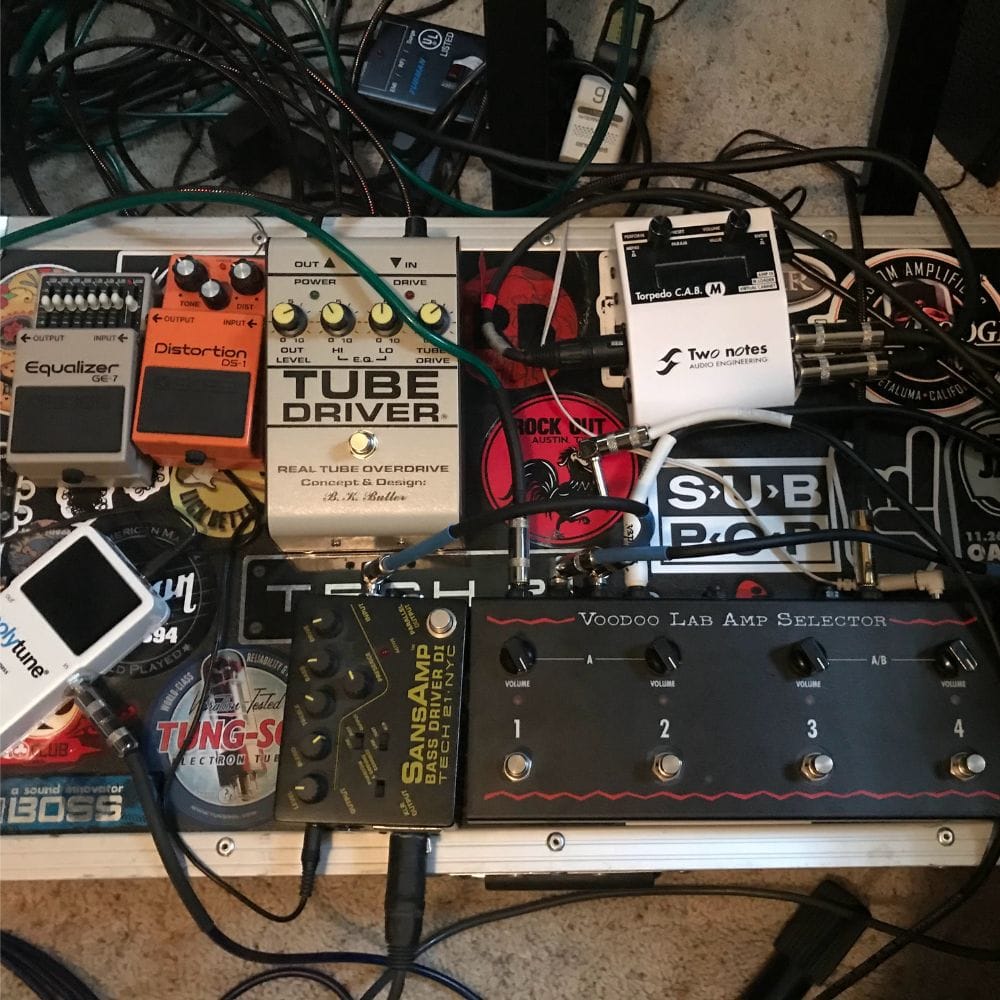A Gruff History: The Evolution of Bass Fuzz Pedals

A bass fuzz pedal is an effect unit that bass players use to create a distorted, fuzzy tone. It transforms a clean, smooth bass line into a gritty, roaring sound.
A bass fuzz pedal works by clipping the signal from your bass guitar, creating a distorted, "fuzzy" sound. It's designed to handle the lower frequencies of the bass guitar without losing the low-end punch.
The Birth of Bass Fuzz
Let's rewind to the 1960s, a time of musical revolution. Amidst this dynamism, the bass fuzz pedal was born. But why? Bass players wanted more. They craved a sound that could match the intensity of the electric guitar. The result? A device that could transform a clean, smooth bass line into a gritty, roaring beast.
The First Bass Fuzz Pedal: A Game Changer
In the mid-60s, the Maestro FZ-1, often considered the first fuzz pedal, made its debut. However, it wasn't initially designed for bass. It was the Rolling Stones' hit "Satisfaction" that brought the pedal into the limelight. Suddenly, everyone wanted that fuzzy tone. But what about the bass players?
Bass Players Join the Fuzz Club
Bass players soon jumped on the fuzz bandwagon. They began experimenting with guitar fuzz pedals, pushing the boundaries of their sound. This was a pivotal moment in the history of bass fuzz pedals. It marked the beginning of a sonic adventure that continues to this day.
The Creation of Dedicated Bass Fuzz Pedals
As the demand grew, manufacturers started designing fuzz pedals specifically for the bass. These early bass fuzz pedals were engineered to handle the lower frequencies of the bass guitar without losing the low-end punch. This was a game-changer for bass players, opening up a world of new tonal possibilities.
The 70s and 80s: The Golden Age of Bass Fuzz
The 70s and 80s ushered in what many consider the golden age of bass fuzz. Bands like Black Sabbath and Led Zeppelin used bass fuzz to create their iconic heavy sound. The bass was no longer just a rhythm instrument – it was a force to be reckoned with.
The Modern Bass Fuzz Pedal: Innovation and Evolution
Fast forward to today, and the bass fuzz pedal has evolved into a staple of many bassists' gear. Modern pedals offer a plethora of controls and features, allowing players to fine-tune their fuzz tone to perfection. From silicon to germanium transistors, from subtle fuzz to wall-shaking roar, the options are limitless.
Bass Fuzz in Different Music Genres
Bass fuzz is no longer just for rock and metal. It's used in a variety of genres, including blues, jazz, funk, and even pop. This versatility has helped bass fuzz maintain its relevance and popularity over the years.
Famous Bassists and Their Fuzz
Many famous bassists have embraced the fuzz effect, each bringing their unique twist to it. From Geezer Butler's heavy fuzz in Black Sabbath to Chris Wolstenholme's aggressive tone in Muse, these artists have shaped the sound of bass fuzz and continue to inspire new generations.
Choosing Your Bass Fuzz Pedal
Choosing a bass fuzz pedal is a personal decision. It depends on your musical style, your gear, and the sound you're after. Some prefer vintage-style fuzz, while others opt for modern pedals with more control and versatility. There's no right or wrong choice – just what works best for you.
The Future of Bass Fuzz
So, what's next for bass fuzz? As technology advances and musicians continue to push the boundaries of sound, we can expect to see more innovation and evolution in bass fuzz pedals. From more control options to new sound characteristics, the possibilities are endless.
But one thing's for sure: the bass fuzz pedal, born out of a desire for more, will continue to evolve, inspire, and rock our world.

Bass Fuzz FAQs
Who were some of the first musicians to use bass fuzz pedals?
Bands like Black Sabbath and Led Zeppelin were among the first to use bass fuzz pedals. They used them to create a heavier, more aggressive bass sound.
Can I use a guitar fuzz pedal for my bass?
While you can technically use a guitar fuzz pedal for your bass, it might not produce the best results. Guitar fuzz pedals are not designed to handle the lower frequencies of a bass guitar, so you may lose some low-end punch.
Are there different types of bass fuzz pedals?
Yes, there are different types of bass fuzz pedals, each with its unique sound characteristics. Some use silicon transistors, while others use germanium transistors. Some offer a subtle fuzz, while others can produce a wall-shaking roar.
What kind of music genres commonly use bass fuzz?
Bass fuzz is used in a variety of genres, including rock, metal, blues, jazz, funk, and even pop. It's a versatile effect that can add depth and intensity to your bass lines.
How do I choose the right bass fuzz pedal for me?
Choosing the right bass fuzz pedal depends on your musical style, your gear, and the sound you're after. It's about experimenting with different pedals and finding the one that gives you the tone you want.
Can I use a bass fuzz pedal with other effects?
Absolutely! Many bass players use a combination of effects to create their unique sound. A bass fuzz pedal can be used with other effects like chorus, delay, or reverb.
Is a bass fuzz pedal difficult to use?
Not at all. Most bass fuzz pedals have straightforward controls that allow you to adjust the level of fuzz and other parameters. It might take some time and experimentation to find your ideal settings, but that's part of the fun!
What is the future of bass fuzz pedals?
As technology advances and musicians continue to push the boundaries of sound, we can expect to see more innovation and evolution in bass fuzz pedals. From more control options to new sound characteristics, the possibilities are endless.
In conclusion, the history of the bass fuzz pedal is a fascinating tale of innovation, evolution, and a relentless quest for the perfect tone. From its humble beginnings in the 60s to its modern incarnations, the bass fuzz pedal has left an indelible mark on music.
It's not just a piece of gear – it's a testament to the power of creativity and the endless possibilities of sound.
*FYI, when you make a qualifying purchase through one of our links, we might receive a small commission from Amazon or other retailers, at no additional cost to you, which helps us to fund this site. It's a way to find what you're looking for while supporting us in the process!
